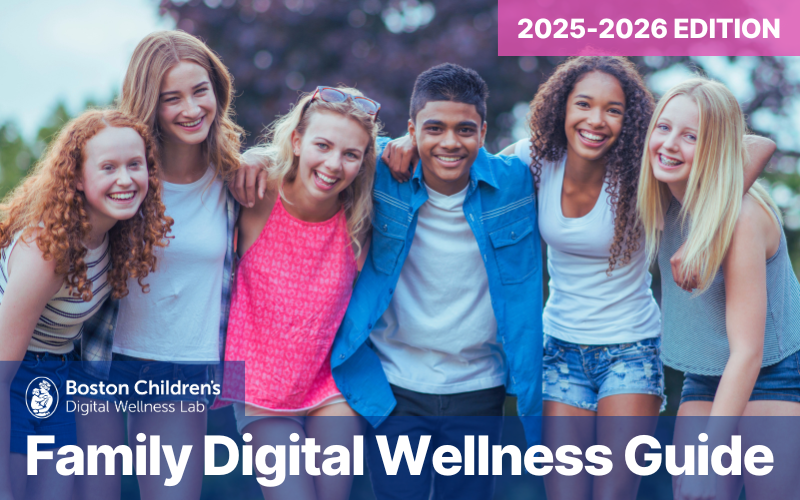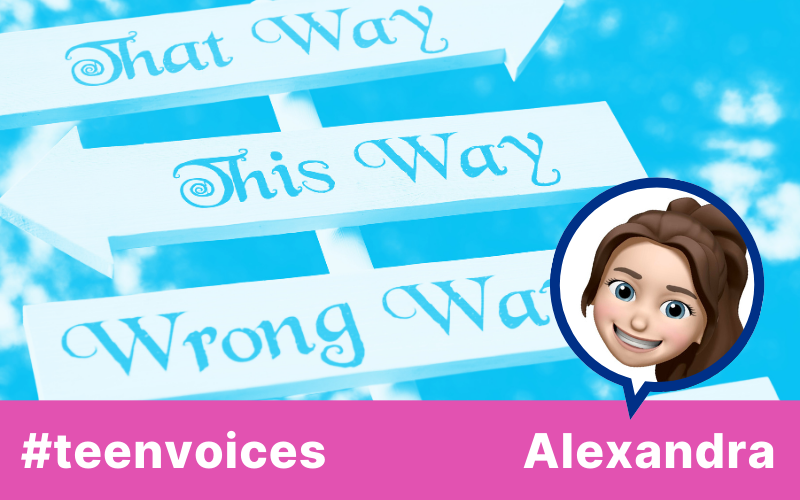Authored by Alexandra S.
2024 Summer Teen Advisor at the Digital Wellness Lab
The teenage years have always been a time of growth, maturation, and emerging responsibility, and the recent boom of technology has only made this more so; new phones, access to social media platforms, and freedom to utilize online spaces have begun to come with the territory of turning thirteen. As a teenager myself, I understand what it’s like to be beginning to navigate the strange world of the internet and online interactions, and how overwhelming it can be. While our parents are able to guide us with seasoned knowledge about things like growth spurts and entering high school, there is not much precedent for safe use of the current online world. You are taught from a young age never to get into a white van with a stranger who advertises free puppies and candy — to never even speak with a stranger — and yet not many are taught to use the same level of caution online. But, a person behind a screen can be just as dangerous and harmful as one standing in front of you. My hope is to instill an awareness and attentiveness into my fellow teens so that you are able to feel as confident, comfortable, and secure on your phones as you feel walking down your street.
Keep Your Personal Information Private
It may seem, nowadays, that it is the norm for people to post anything and everything — pictures from their family vacations, updates on their relationships, memories from their past year — but not everything needs to be or should be put online. What you are seeing on social media are posts not just from friends, but also from influencers whose job it is to post constantly: most teens don’t, and shouldn’t, post everything about their lives. So don’t feel pressure to put pictures out there. Now, occasionally posting on social media can be a fun way to update your friends about the highlights of your life! But if you decide to post, be wary of what you are putting out there.
- Make sure there is no personal or identifying information shown such as your address, the front of your house, your school, or your full name. It might seem silly to exercise such caution, but it is important to keep this information safe and private from strangers on the internet; you would never walk through a city with a sign stating where you live, so you should not advertise this online either! I didn’t even put my last initial onto my social media accounts until very recently! 40% of teenagers are made uncomfortable online from others trying to receive their personal information, and you don’t want to make it even easier for them by just putting your information out there (Thorn, 2022).
- It also helps to maintain your security by making your accounts private. Most social media platforms initially set your account as public when you create it, so make sure to go into the settings and change that! Having a private account allows you to control who follows you and who will see what you post. Personally, I don’t let anyone follow me on social media whom I don’t actually know. Now, not everyone is that extreme, deciding to allow friends-of-friends and acquaintances they’ve met only once to follow them in order to expand their platform. But even then, you still have control over your accounts and can personally make the decision whether to allow that specific person to follow you. If you make your account public, you relinquish that control and put yourself in a position where you have no idea who is looking at your posts.
Don’t Engage with Strangers
When you are online, whether it is through social media, gaming, or otherwise, you should never engage in conversation with a stranger. You never know if what they are saying about themselves is true, and someone who seems like a relatable, friendly teenager can very well be a grown adult trying to take advantage of you. Some people truly are simply looking for friendship and someone to talk to outside of their regular life, but others are looking to manipulate you into an inappropriate relationship, providing passwords, or giving access to money. I have received tons of messages from people I do not know on Facebook, and my immediate reaction is to block them. I know that that way I am not taking any chances, and I am keeping myself safe. It is always okay to block or not respond to someone if you feel uncomfortable; don’t worry about hurting their feelings, what matters is protecting yourself. 79% of teens make the mistake of reporting users once a month or less and 71% blocking users with that same frequency, despite the majority of them believing that dangerous and inappropriate content is not effectively removed by social media platforms (Digital Wellness Lab, 2023). Don’t make their same mistake of allowing yourself to continuously be exposed to harmful people. Even accounts that seem like people you know in real life can be strangers, so always be cautious. I once had an account impersonating my grandma try to friend me and other family members on social media, presumably to try and extort money! I knew it felt suspicious because my grandma already had an account following me, so I decided to call her about it before accepting anything — it’s a good thing I did because we were able to shut it down. Always trust your gut with these things, and you can always ask someone close to you to take a look and help clear the issue up if you are unsure and want a second opinion.
Similarly, you should never, ever begin any sort of relationship, romantic or otherwise, with someone you meet online. As I said before —and I’ll say again because it is so important — you never know if who they say they are is who they really are. You don’t want to put yourself in a position where you are in danger. So many teens have been manipulated into a secret relationship with someone online who only is looking to take advantage of them and hurt them. 65% of kids your age say they can trust their real friends but only 22% say they can trust the friends they’ve made online (Thorn, 2023); so take it from teens like you who have been where you are and have already started to explore online: there is more of a support system and deep friendship in real, personal relationships.
Sharing Photos and Videos Online is Forever
You may be in the 32% of teenagers aged 13-17 who believe it is normal and common for teenagers to share inappropriate photos of themselves — you might hear stories about it, your friends might be doing it, people might ask you to do it — but inappropriate or revealing photos of yourself should never be sent or posted to anyone (Thorn, 2023). Whether it is a stranger or a close friend messaging you, the answer should be “no” every time. Any picture you put out there will stay there forever, no matter how hard you may try to get it back, and while I hate to say it, you never know what someone’s intentions are, no matter how well you know them. They might decide to send the photos around as a joke, or maybe in anger if you get into a fight or end your relationship. Some may even use a person’s photos as a way to blackmail and manipulate them into doing tasks they wouldn’t otherwise do. The safest thing to do is never send them in the first place. A true friend or partner would understand that you are doing what is safest.
Find a Trusted Adult
The last suggestion I want to give you is that if something worries you, it is so important to talk to a parent or trusted adult. If you see something that upsets you, a person is cyberbullying you, you made a mistake posting something bad or talking with someone bad, you can always turn to someone you trust and ask for their support and advice. No one is going to get mad at you or punish you for trusting them with what is making you uncomfortable. The most important thing is to fix the situation and ensure it does not happen again, and while it may be scary to reach out for help, you will feel so relieved that you did it. But even before it gets to a point where you are stuck in a terrible situation, you should have an open discussion with your parents or other adults about your online use. If something even begins to worry you or seems off, go talk to them. It is easier to prevent a situation before it starts than to clean it up afterwards.
As you start to gain more responsibility and freedom with technology, know that it is okay to learn and make mistakes. That is only human! But there are things you can do to protect yourself online and make sure that the environment you enter into is one of safety, respect, trust, and comfort. Look out for yourselves and those around you — that way you can fully embrace everything the digital world has to offer!
The author of this article is a young person who has been engaging with the Digital Wellness Lab about topics of young people’s safety and wellbeing within digital environments. Here at the Lab, we welcome different viewpoints and perspectives. However, the opinions and ideas expressed here do not necessarily represent the views, research, or recommendations of the Digital Wellness Lab, Boston Children’s Hospital, or affiliates.








